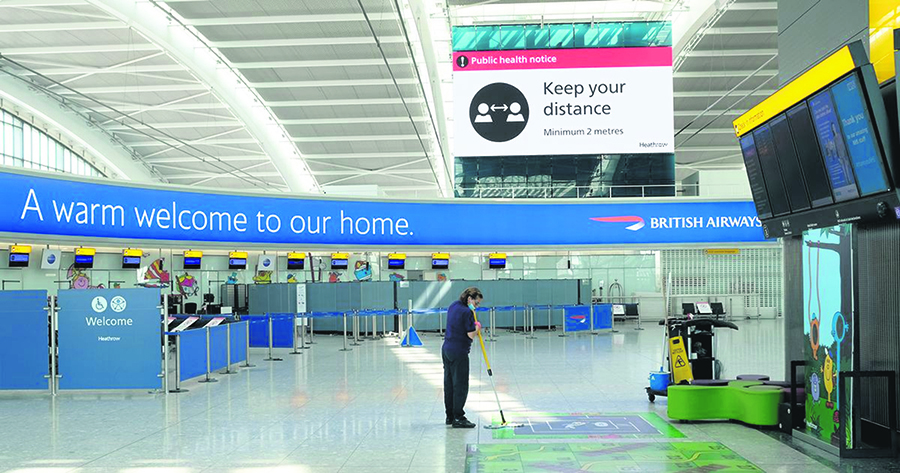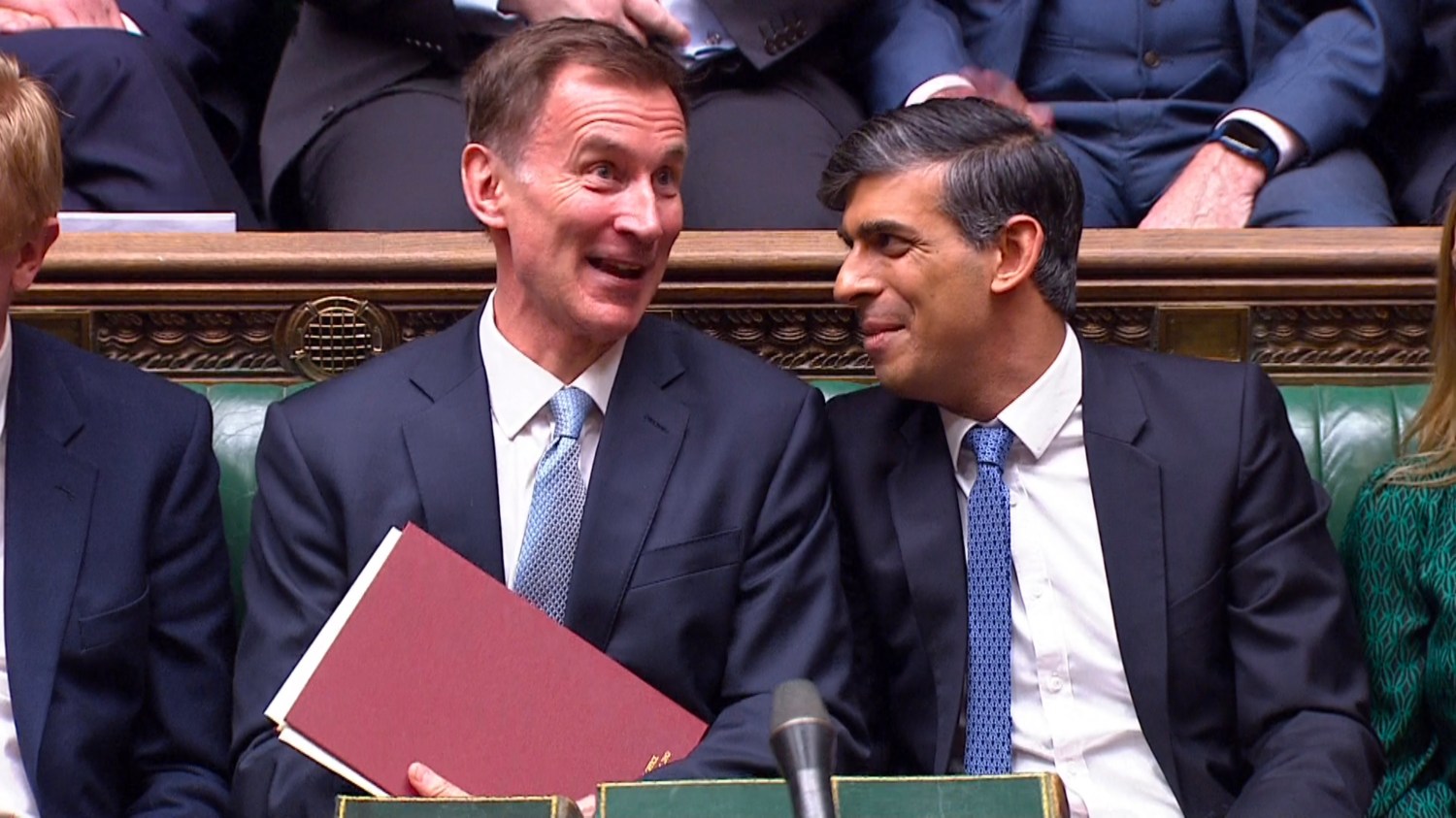Comment
Comment: ‘Zero Covid’ is a hard left hustle

by Matthew Paul
Just like the real thing, for Coronazis winning is never enough. However hard the UK and Welsh governments attempt to clamp down on the Covid, for lockdown lovers it is always too little, too late.
The whole UK has been shut down since before Christmas. Matt Hancock’s latest wheeze is that people living in areas with the never-met-a-nice-South-African variant should eat up every last mouldy lentil, sorry gherkin and crusted pot of Birds custard in the deepest recess of their kitchen cupboards before venturing out to resupply. Vaughan Gething is warning people in Wales that they won’t be allowed summer holidays abroad (booked two weeks in Tuscany already. Up yours, Vaughan).
The first lockdown, plus the little lockdownette in November, were only the Coronazis’ Anschluss and Sudetenland. The real blitz started just in time to spoil Christmas. Now, they’re planning Barbarossa. Or, as lockdown lovers would have it, “Zero Covid”.
Well, it sounds sensible enough, doesn’t it? Getting rid of the Covid altogether so we can go back to life as normal? After all, New Zealand shut out foreigners and has had hardly any Covid. Australia closed its borders on 20th March last year and is likely to keep them closed through the whole of 2021. In China, where the whole thing started, they’re having pool parties again. And all because people were good and obeyed the rules. More rules and more obedience must be the answer in Britain, too.
There are many things they do in China that we wouldn’t contemplate here. Chaining Uighur women to concentration camp beds to facilitate their rape is one such thing; welding people inside their apartment blocks until the Angel of Death has temporarily winged elsewhere another. More prosaically, the Chinese government operates a fantastically effective track and trace operation that is fantastically effective because Chinese people have no choice other than to have the state tracking and tracing them all the time; Covid or no Covid.
China, Vietnam and other communist countries where people are accustomed to doing what they’re told have (if we are to believe what their governments tell us) had high rates of success in dealing with the virus, and this has emboldened the hard left in Britain to call for us to follow their benign and progressive example. All the worst people in the Labour Party, smarting from their tumble into post-Corbyn irrelevance, have been banging on since September that the only way forward is to eradicate Covid-19 altogether, whatever the cost.
The Government, they demand, must enforce a “proper lockdown”. With welding torches, presumably. How long should it last? “As long as is needed”. Borders must be closed. People might get a bit short of cash when they’re welded inside so a minimum basic income will pay for everyone in the country to sit at home doing nothing. Which is an activity the National Education Union find particularly congenial and are anxious to see continue, rather than doing risky and tiresome things like teaching children.
Perhaps the least significant problem with Zero Covid is that it’s impossible. Yes, smallpox was eradicated, but several factors unique to smallpox contributed to the success of this effort, including easily-diagnosed clinical disease, lack of subclinical infections, absence of transmission during prodrome, and lack of an animal reservoir. Even setting aside the reliability of PCR testing, Covid has around 30% of asymptomatic infection, frequent asymptomatic transmission and those pesky pangolins (and bats) to keep it ticking over. Eradicating it would be about as straightforward as eliminating the common cold.
The only other disease we’ve ever eradicated was rinderpest. With rinderpest, an effective vaccination programme was assisted by the practicability of slaughtering millions of those suffering from the disease (and any nearby populations likely to become infected): a relatively cheap and undeniably effective strategy for infection control which, oddly, even the Communist Party of China has yet fully to embrace in dealing with the Covid.
The UK’s response to the pandemic has been captured by the priority to reduce Covid cases, rather than alleviating the worst of the pressure on the NHS. As soon as the groups at greatest risk of harm from the virus have been vaccinated, the country needs to open up without delay. The Coronavirus’ capacity to mutate means Covid-19 will be a running target for the foreseeable future. The choice the Government has to make is turning the UK into an island fortress (and still very probably failing to eliminate a fast-moving endemic disease), or opening back up to the world and living with the risk of another seasonal disease –like flu– that will kill lots of elderly people every year, and ultimately cause us little concern.
In a post-Brexit Britain, closing our borders against the Covid is neither practicable nor desirable. Tory Brexiters’ vision was of a global Britain; global Britain and Zero Covid are mutually irreconcilable objectives. Corbynites, on the other hand, always liked the look of Brexit for their own reasons. Brussels was a bosses’ club and open borders meant bosses could import cheap labour. The left want to seize the opportunity afforded by the pandemic to garland the borders with barbed wire, just like a proper socialist country.
Zero Covid means zero travel, zero trade, zero growth and zero freedom. Zero Covid isn’t ultimately about eliminating Covid; it’s a hard left hustle to eliminate free enterprise and create an economy totally dominated by the state.
Comment
Y Gymraeg mewn ysgolion Cymraeg yn darllen ymlaen yn English

I make no apologies for being unable to speak Welsh, writes John Elliot.
Google translate did the title for me. I apologise to Welsh readers should the Welsh be dreadful.
My Dad was a labourer in a factory. We are talking 1960’s here. Mum and Dad were ignorant of education, they hadn’t a clue what ‘O’ levels were. And my older sister was learning French! This was like, well, there is a man on the moon after all. One day my dad said, talking about learning French, ‘I think your school, Rosie, should have a day a week where only French is spoken. You’d learn a lot better.’
Like my sister, I ‘learned’ French in school. She went onto to study it in college. I really couldn’t be bothered. Maybe though it was the way I was taught. A lesson or two a week by rote, repetition and irrelevant. When was I going to need French? Like since 1995 when I moved to France.
Because of a language project I’m working on with a university in Hungary I’ve become very interested in the purpose of the Welsh language. Also, very importantly, my granddaughters were born in Wales and attend Welsh medium schools.
For the purpose of the project with the university I contacted the Welsh Education Secretary in relation to how Welsh is taught in Schools. My interest was school and teaching within the state section. The bill is itself 55 pages long. I have taken 11 points from it, so a minority of the text relevant to my interest in the
Welsh language in Wales and the current government’s attitude to it. This is a current bill and has yet to be passed by the Senned. The following points I am confident that they represent the words of the bill, but of course they are subject to my interpretation and editing. I think they will be of particular interest to parents, and of course those interested in language.
The bill, with reference to Wales, is making the following points:
- Every pupil should be allowed, deserves, to be a confident Welsh speaker.
- There is a commitment to all pupils receiving a portion of their education through the medium of Welsh beyond Welsh as a subject.
- In the ideal world 50% of pupils should receive Welsh education.
- At present there are half a million Welsh speakers, it is hoped that figure will be 1 million by 2050.
- The desire is for an education system to embrace Welsh as a language that belongs to all pupils in Wales. All pupils leaving statutory education at 16 can speak Welsh with confidence.
- It is hoped that the number of Welsh-medium schools (that is those schools whose education is mainly in Welsh) will be increased. It is hoped that there will be an increase in the teaching of Welsh in schools. To achieve this there needs to be an increase in the number of people able to teach Welsh and through the medium of Welsh.
- It is intended that there will be dual language schools as well as Welsh-medium schools. There are already some.
- With the proposal set out in this bill it is stated:
- We expect local authorities to pay attention to promoting and raising awareness of Welsh-medium education.
- An organisation for playgroups within Wales is Mudiad Meithrin. These are Welsh-medium playgroups for pre-school children. The language spoken is Welsh. Mudiad Meithrin states that 76% of their intake is from non-Welsh speaking families.
- In 2015 The National Centre for learning Welsh was set specifically for adults wishing to learn Welsh.
- It is worth noting that, to use contrasting examples in Gwynedd there are 80 Welsh medium schools and zero English schools. In Cardiff there are 18 Welsh medium schools and 96 English schools.
As I’ve already mentioned my granddaughters, pictured here are bi-lingual, English and Welsh. They speak both languages as if it were the norm, this is what we do. I live in France. The girls have already picked up some French. My grandson was born in Belgium. His birth language is English. His school language is French. He is also bi-lingual. Flemish is also spoken in Belgium, he confident in Flemish.
John Elliot works as an editor of poetry anthologies with different universities throughout Europe. He is currently producing an anthology of Welsh poets translated into English, Hungarian and German
Comment
The Chancellor’s fancy footwork solves nothing

THE CONDITIONAL phrase is a friend to politicians of all parties in all governments.
At its simplest, the proposition is: “If this happens, then we might be able to do this”.
The Chancellor’s Budget on Wednesday (Mar 6) was an example of the conditional phrase on steroids.
IT ALL DEPENDS
“If this happens, then that happens, and provided these things also happen, we might be in a position to consider doing this”.
As a strategy for spending on public services, it’s nonsense.
The UK Government is not in control of events that might affect its capacity to achieve even stage one of the processes that, on some far-away date, might mean it gets close to delivering public services more efficiently.
Let’s get that out of the way, for starters.
That is quite bad enough, but the Chancellor – not alone in this fiscal fraud – goes one step further.
Mr Hunt says the UK must cut its national debt, the amount it has borrowed to pay for Covid, Liz Truss, and other disasters. That objective is noble but meaningless. The debt the UK owes will rise over the next three years. It will only fall in the fifth year of the spending cycle and then only against the previous year’s debt.
That means the amount of debt the UK is in will rise over the next half-decade.
In turn, future repayments of that debt’s capital must be met out of future government revenues. The limited number of ways that can happen include refinancing the debt (putting off the payment to the future), raising taxes, and cutting public spending: probably a mix of all three.
The disingenuous lunatics on the Conservative right-wing bang on about how it’s all the Office of Budget Responsibility’s fault. The rules on debt and fiscal policy are not the OBR’s rules. They are the Chancellor’s. The OBR applies them to the Chancellor’s spending and taxation plans.
It is rather like Harold Shipman complaining he only murdered his victims because the pharmacist supplied him with poison. The intent is all on the Chancellor’s part.
Keir Starmer claimed the Government had “maxed-out” the nation’s credit card.
He is right, but only to an extent.
The central flaw in fiscal policy is that the Treasury—and therefore the Office of Budget Responsibility—fails to distinguish between borrowing and spending for investment and borrowing and spending to deliver day-to-day services and to make up for revenue shortfalls.
As Labour has chained itself to the wheel of the current spending approach, we will have to get used to paying more for less for years to come.
Any UK Government could borrow for future investment, putting the National Debt above 100% of GDP. However, that will likely increase the cost of borrowing and devalue the assets securing the current debt, such as UK Government bonds.
The markets wouldn’t wear that when Liz Truss tried it. They won’t wear it now. Borrowing more money while cutting taxes is like taking out a £500,000 loan, leaving a well-paid job that could service it, and deciding to work three shifts a week on a filling station forecourt.
Sooner or later, the bailiffs come knocking.
THE BOTTOM LINE
The political back-and-forth is interesting only to those with little stake in the Budget’s outcome, at least as it affects average families on average incomes.
A billion here, a hundred million there. Those are empty numbers.
The bottom line matters.
The Chancellor announced a cut in National Insurance from 10% to 8%. Last year, he reduced it by 12% to 10%. Forgetting, of course, that his predecessor (Sunak, R.) increased National Insurance in the first place.
However, Mr Hunt did not increase the wage level at which National Insurance starts being paid. That means the amount by which most workers on modest or average wages benefit from an NI cut will be eaten up by any pay increases they’ve received over the last two years of high inflation.
The income tax thresholds also remain stationary, pulling more people into paying the basic rate thanks to pay increases and the increased National Minimum Wage.
It’s sleight of hand. An apparent tax cut will leave people superficially better off but no richer.
In other titbits, the Chancellor announced the continuation of the 5p levy reduction on fuel for motor vehicles and a freeze on the duty on booze.
Mr Hunt also unveiled a new tax on vaping products from October 2026, linked to the levels of nicotine they deliver. At the same time, tobacco duty will rise by £2.00 per 100 cigarettes to ensure vaping remains cheaper.
From this April, the threshold at which small businesses must register to pay VAT goes up from £85,000 to £90,000. It’s something, but not much of something, as the threshold’s been frozen for the last seven years.
Mr Hunt also scrapped tax reliefs for the owners of furnished holiday lets. Holidays let owners claim capital gains tax reliefs and plant and machinery capital allowances for items such as furniture and other fixtures. At the same time, their profits can count as earnings for pension purposes.
Abolishing that tax break will save the UK government around £250 million annually starting from April 2025.
Holiday let investors could lose an average of £2,835 a year in tax, based on a property purchase price of £350,000, an annual mortgage rate of 4.5%, and £20,000 in rental income.
PUBLIC SERVICES IN LIMBO
The constant drive for “greater efficiency” in the public sector boldly and unfoundedly assumes that public service “productivity” is the same as the private sector’s. It isn’t.
Making a pin more efficiently through the division of labour is not the same as treating a patient for cancer or collecting bins.
In all efficiency drives, the point always arrives when there are no more lightbulbs or photocopiers to turn off at night, meaning savings must be found in frontline service budgets. Mr Hunt announced plans to “digitally transform” the NHS. Fat chance. The atomisation of the NHS into trusts and boards that must compete for money by offering the most at the least cost dooms the project to expensive failure.
The same applies to local government funding and extends to Wales.
Councils competing against each other for a finite pot of resources only available to spend on what the central Government insists it is spent on negates local democracy. It favours those local authorities closest to the Central Government or with the best grants application team.
Competition for funding is no way to deliver public services and leads to vanity projects.
It is better to deliver funding fairly and through a method that ensures funding follows the need for core services.
The question is acute in Pembrokeshire.
Our Council received millions of pounds in funding for projects Pembrokeshire does not necessarily need. The money would have been better allocated to the cost of adult social care delivery. However, the UK and Welsh Governments did not make tens of millions of pounds available to meet that need. Instead, we can have money for “Instagrammable bridges” and “transport hubs” because we won a prize in a competition with other broke local authorities to build things we don’t need.
It’s nonsense. And, at heart, every county councillor knows it is.
Any elected representative (whether councillor, MP, or MS) who doesn’t is unfit for public office.
Comment
Free digital drop-in events to help you get connected

DO you or a friend or family member need support with digital technology?
Would you like to know how to use a smartphone, tablet, an Alexa, or another digital device?
If so, a series of free, drop-in sessions across the County will help you get connected (see below).
You can bring your own digital device, tablet or mobile phone or use one of the free access computers. Please ask questions and get support.
Matthew Wall from the Digital Community Support team said: “We’re here to help anyone who wants to get to grips with digital technology, and is unsure about where to start.”
Drop in to find out how to help you:
- Get online.
- Keep in touch with your family, friends and local community.
- Make life easier at home with technology.
- Identify how technology can help you look after somebody.
- Make the most of your device for entertainment and information.
- Set up a borrowbox account (to access E-Book service)
- Find out what digital equipment you can borrow.
- Find out about training.
- No broadband at home? No problem. Just drop in for more details.
Laura Evans from Pembrokeshire Libraries team said: “The aim of the digital drop-in sessions are to help and support the local community with their devices and accessing the internet.
“Libraries play a key role in providing access to technology, which can help combat isolation and loneliness. Having drop in sessions helps people to connect in a way that they would not be able to do on their own.”
Digital devices can support in so many ways. For example, if you look after someone or are cared for, find out how technology can help you from scheduling appointments, medication reminders or simply feeling safe in your home.
Digital Drop In sessions are FREE to access and open to everyone. There is no need to book, just turn up between the allocated times throughout the day.
The Digital Community Support Team are offering sessions at the following Pembrokeshire Libraries.
All sessions are 10am-12pm and 1pm-4pm.
Glan-Yr-Afon, Haverfordwest Library (01437 775244), Thursday November 16th.
Pembroke Dock Library (01437 775825), Wednesday November 22nd.
Tenby Library (01437 775151), Thursday November 23rd.
Fishguard Library (01437 776638), Friday November 24th.
Milford Haven Library (01437 771888), Thursday December 7th.
The digital community support team is funded by Welsh Government.
If you have any questions or would like support, please phone 01437 764551 and ask for Digital Community Support or email [email protected]
-

 News6 days ago
News6 days agoPolice issue update on the search for Luke, missing from Pembroke Dock
-

 News18 hours ago
News18 hours agoPolice and air ambulances at ‘serious incident’ at West Wales school
-

 Sport6 days ago
Sport6 days agoHerbrandston Clinch Promotion to Division One
-

 News5 days ago
News5 days ago20mph U-turn: Some roads will return to 30mph following public outcry
-

 Community5 days ago
Community5 days agoMiracle pup finds her forever home after heart-wrenching journey
-

 Community2 days ago
Community2 days agoCounty Hall to offer space for community banking
-

 Crime3 days ago
Crime3 days agoBrian Davis: Wanted on suspicion of commercial burglary
-

 Crime17 hours ago
Crime17 hours agoPembrokeshire pensioner accused of 17 sexual offences against children

































